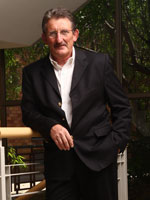
Subscribe & Follow
'Licence to operate' is key hurdle for African mines

According to Roger Dixon, chairman of global consulting engineers and scientists - SRK Consulting, this legitimacy underpins the licence to operate that nations bestow on mineral producers.
"This licence to operate is not just a matter of legal compliance but includes companies' commitment to broad social engagement and to effective environment sustainability," said Dixon. "For instance, the aspirations of local communities need to be accommodated by the large, international construction contracts that are carried out by foreign companies."
He said local people often don't have the skills and training to contribute to - and hence benefit from - these projects.
"In the absence of pro-active and constructive intervention by the key players in these projects, many stakeholders in host countries will remain marginalised from economic opportunities - and this will create problems sooner or later," he said. Dixon said there was already a political back-lash in countries like Zambia regarding how certain foreign mining companies treated local workers.
Worker militancy
South Africa's mining sector itself is struggling with unprecedented levels of worker militancy, leading to violent demonstrations and putting struggling mining companies on a collision course with both labour and government.
It is fitting, therefore, that the Mining Indaba to be held in Cape Town in February has for some years extended its financial and technical focus to the broader social and political pressures that all stakeholders need to address.
"There is a growing urgency around the African continent in the demand for jobs and a reasonable standard of living, and there are great expectations of the mining sector from the ranks of the poor and unemployed," said Dixon. "This is clearly relevant not only to mining companies, but it is appropriate that the conference has shown a growing interest in corporate social responsibility, for instance, and other aspects of how mining relates to the development of communities."
He said that expert advice and project management from experienced practitioners is required to guide foreign investors and developers through this important field of engagement.
SRK's global network - developed from its South African base over the past four decades - now includes offices in a number of other African countries including the Democratic Republic of Congo, Ghana, Zimbabwe, a joint venture in Angola and a soon-to-be-opened office in Yaounde, Cameroon.
Constructive discussion
"At this year's indaba, we are looking forward as always to a constructive discussion on the key issues of sustainable development and community engagement," said Dixon.
"Much has been done to raise the profile of these issues by the International Council on Mining and Metals (ICMM), and we will certainly be participating in these sessions, as we have done in the past. We need to understand better how mining investments and projects impact on local communities, so that we can make sure that there are benefits for everyone involved."
He said that Africa is a region of substantial growth, compared to many areas of the world that remain economically depressed.
"If business is looking for good long-term investments, where better to go than Africa?" he said, adding that in addition to mineral wealth, the continent's per capital income is rising and creating a large market for a range of goods and services.






